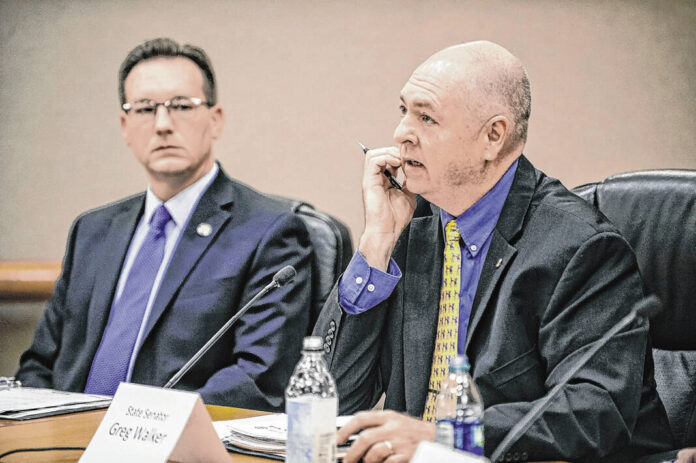
Mike Wolanin | The Republic Rep. Ryan Lauer, R-Columbus, and Sen. Greg Walker, R-Columbus, address issues related to legislation during a Third House session with state legislators in the council chambers at Columbus City Hall in Columbus, Ind., Monday, March 25, 2019.
COLUMBUS, Ind. — Three state lawmakers who represent parts of Bartholomew County chatted online Monday with constituents and students from ABC Stewart School at a Third House session.
Rep. Ryan Lauer, R-Columbus, Rep. Jennifer Meltzer, R-Shelbyville and Sen. Greg Walker, R-Columbus, logged in to Monday’s Third House where they discussed bills related to harmful materials for minors, school funding and other topics.
The sessions, sponsored by the Columbus Area Chamber of Commerce, are opportunities for community members to interact with legislators during the legislative session, and are continuing in a virtual format with questions submitted in advance from the public.
One bill that was discussed on Monday was SB 12, which seeks to ban materials deemed “harmful to minors” in school libraries. The measure cleared the Senate in a 37-12 vote on Feb. 28.
Language in the bill would remove “educational purposes” as legal defense that public schools and libraries could could use for disseminating “harmful material” to students — books or other materials deemed obscene, pornographic or violent.
The bill would also create a new process for parents to request removal of books they think are “inappropriate” from school libraries.
Walker, who voted in favor of the legislation, was asked during the Third House session to explain his position on the bill.
“I supported the bill because it creates a discussion about books, which I think every school corporation supports, and puts some guardrails around that, too. ” Walker said. “…As long as this bill does not change in any material way from the way it’s drafted now, I’ll continue to support it because I think there should be some guardrails on how we have discussions about materials in a school.”
A member of the public, identified as “a retired educator,” asked about school funding included in the $43.4 billion state budget that the House recently passed and is pending in the Senate.
The Republican-controlled House passed the proposed budget in a 66-29 vote, with no Democratic support, state records show.
Nearly half of the budget would go to K-12 education, which would see an increase $2 billion over its current budget amount – of which one-third would go to vouchers.
Democrats have criticized the proposed budget as taking funding away from traditional public schools. According to the text of the proposed budget, families making up to 400% of the federal poverty level, roughly $220,000, also would qualify for vouchers.
“Traditional public schools will receive an average … of about 6% (increase) in the first year of the biennium but vouchers receive about a 70% increase,” Rep. Greg Porter, D-Indianapolis, told The Indiana Capital Chronicle.
The “retired educator” during the Third House session asked: “Why is there a 70% increase in private school vouchers but only a 5% increase for public schools, where, in Columbus, 90% of the children attend and, in our full county, 94% of the students attend?
“As I understand it, the House is changing some of the income limitations on families eligible for vouchers in private schools, lifting those pretty significantly. That’s where you get the percentage increase. In a raw dollar amount, there would still be vastly more money going to public education, but on a percentage basis, I think that’s accurate,” Walker said, referring to the figures the “retired educator” referenced.
“I think the Senate probably takes a little different tone to that than the House,” Walker added. “…I suspect that those numbers will be heavily debated. I think that will probably be one of the single most hotly debated components of the budget by the time we get to the end of the session.”
For more on this story, see Tuesday’s Republic.




